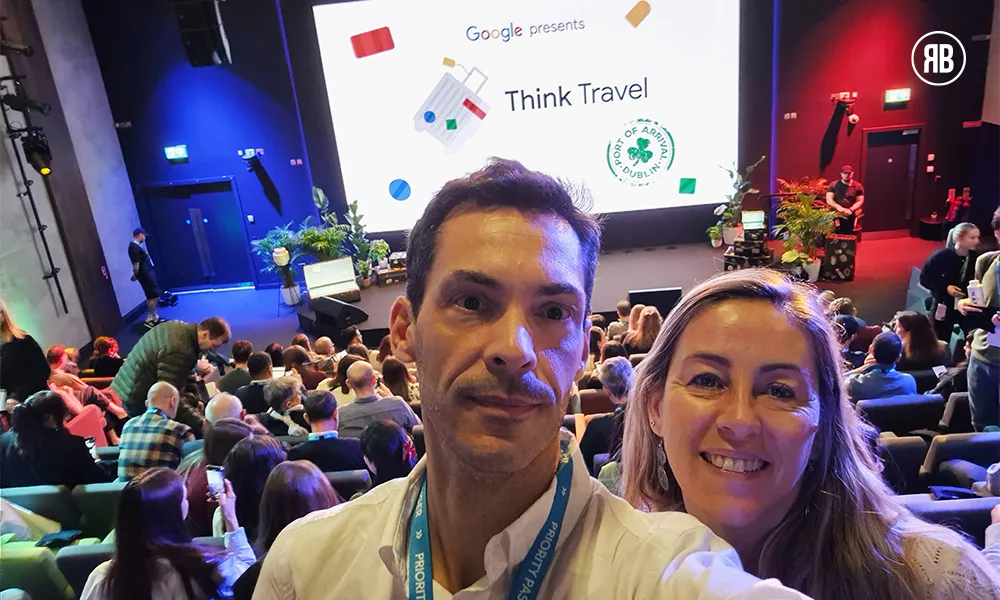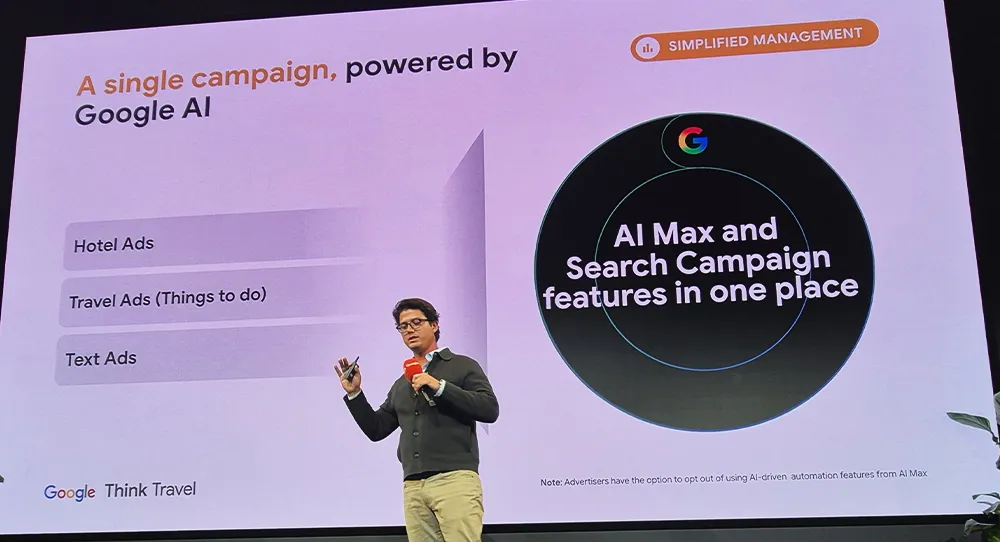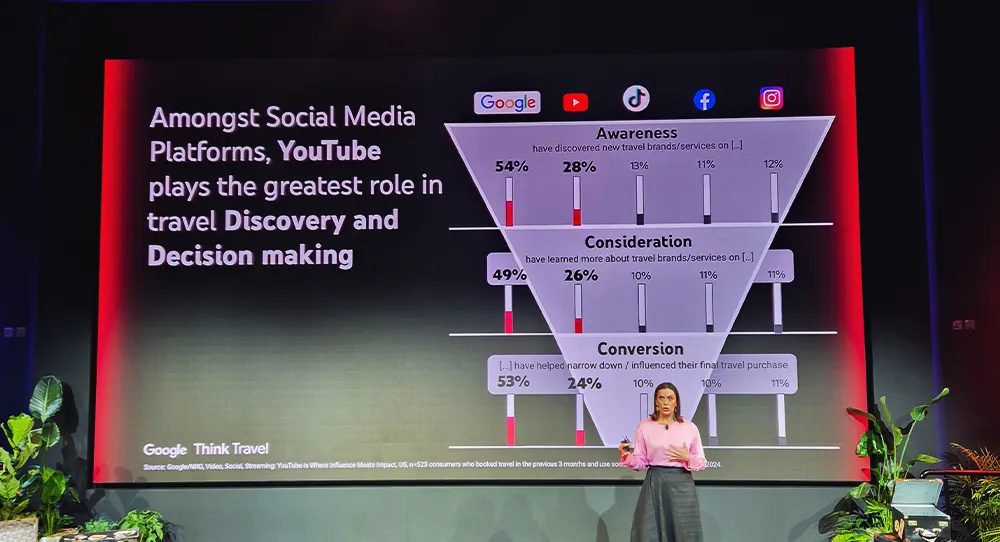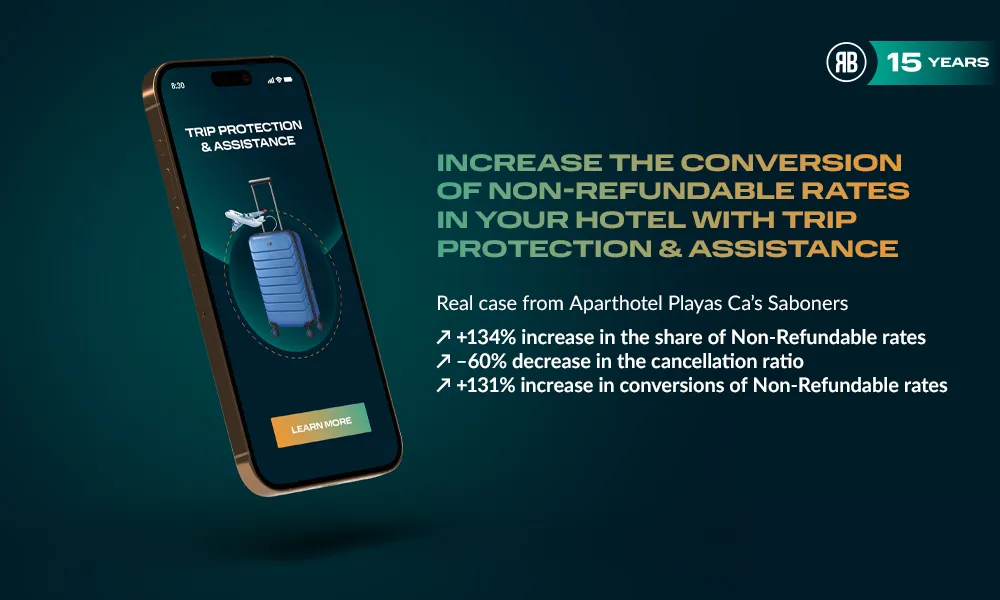Think Travel 2025: How AI is redefining traveler behavior
News
October 24, 2025

After two inspiring days at Google’s EMEA headquarters in Dublin for Think Travel 2025 one thing is clear: travel and marketing are being rewritten by AI.
The conversations, the energy, and the forward-thinking spirit across the ecosystem showed that we’re entering a new era, one where data, creativity, and intelligence converge to redefine how we connect with travelers.

A Booming Travel Future
By 2040, the world will see +2.4 billion trips a year.

Just five markets —China, the United States, Germany, India, and the United Kingdom —will account for 42% of this growth , while competition among the top destinations continues to intensify:
- Spain: +32% (110 million visitors)
- France: +16% (105 million)
- USA: +26% (100 million)
- Mexico: +100% (90 million)
- China: +37% (90 million)

Nearly half of global travelers (45%) will head to four “hot zones”: the Mediterranean, Southeast Asia, the New Middle East, and the Caribbean.
The opportunity is massive — but so is the competition. Destinations and brands that use data and intelligence to understand intent will be the ones winning future travelers’ hearts (and bookings).
The modern traveler has changed
Today’s traveler is more curious, connected, and deliberate than ever.
The average booking journey lasts over 300 minutes, and booking windows are lengthening — from 53 days in 2023 to 61 in 2025.

People no longer search with short keywords; they use longer, conversational queries — “Where can I go on a sustainable vacation with my family in June?” rather than “family resorts in June.”
And with each search, expectations for personalization grow. Travelers want content that understands their needs, not just generic inspiration.
AI is transforming search and marketing
The future of search is intelligent, multimodal, and agentic — meaning it can reason, plan, and act.
At Think Travel, Google unveiled how AI Mode and AI Overview are reshaping the search experience, now live in 40+ EMEA markets.

Soon, travelers won’t just see a list of blue links — they’ll experience an end-to-end AI journey, capable of comparing options, suggesting itineraries, and even booking on their behalf.
Ads will be integrated directly within these AI environments, connecting intent with action in real time.
Search is no longer just a query; it’s an intelligent conversation between traveler and technology.
AI-powered campaigns for the Full Funnel
Google’s new generation of AI-driven tools is redefining how we capture demand:

- AI Max: enhances search campaigns to identify new, unexplored travel intentions.
- Demand Gen: reaches users in Google's most visual environments —YouTube, Shorts, and Discover— turning inspiration into conversion.
- YouTube: is consolidated as the number one streaming platform for discovering trips, influencing all phases, from dreaming to booking.

Together, these tools create a connected ecosystem where performance and storytelling finally merge.
Evolving SEO and regulation in the AI Era
As Google’s AI experiences expand, SEO must evolve.
It’s no longer about optimizing for keywords but creating semantically rich, AI-friendly content that aligns with traveler intent.
At the same time, tech regulations like the Digital Markets Act (DMA) are reshaping the digital landscape in Europe, changing how users navigate search results and how advertisers reach them.
Understanding these regional nuances will be key to maintaining visibility and compliance.
A New Era of connection
Beyond the data and the demos, Think Travel 2025 was about connection — with ideas, with technology, and with each other.
From predictive analytics to hyper-personalization, it’s clear that the next leap in travel will be powered by intelligent, data-driven creativity.
As marketers, we now have the tools, and the responsibility, to use AI not just to optimize campaigns, but to reimagine the traveler experience.
At Roiback, this means applying these insights to build smarter, more personalized digital strategies for our hotel partners around the world. Because travel has always been about timing and connection — and with AI, we’re finally learning how to master both.
Are you ready?
Read more







